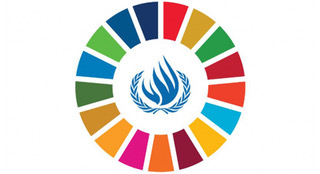‘By 2030, eradicate extreme poverty for all people everywhere’. Here we have the first Sustainable Development Goal and its target.
More than 70 years ago, governments coming out of the Second World War created an era of human rights, and signed their endless commitment to protect them. The inception of the Universal Declaration of Human Rights was followed by several international treaties, which engaged states to end poverty by securing the achievement of fundamental rights, such as the right to an adequate standard of living, the right to the highest achievable mental and physical health, and the right to education.

Then in 2015, states took a historical step by articulating clear political commitments in the 2030 Agenda for Sustainable Development and the 17 Sustainable Development Goals (SDGs), which are intrinsically linked to the enjoyment of human rights. But as the world is about to start a new decade, the 2030 Agenda for Sustainable Development keeps reminding us that we are still far from achieving the goals set, and the clock is ticking.
The figures are frightening: more than 700 million people still live in extreme poverty (living on less than US $1.90 a day). As we sit at the edge of 2020, do our governments still believe that they have the power to erase poverty? For the next ten years, we need to fulfil fundamental rights by investing in human development, and make the 2030 Agenda a reality. And one of the most crucial steps to achieve the 17 SDGs is resource mobilisation.
Ending poverty in all its forms everywhere, a cross-cutting rights issue
The root causes of poverty can be identified as ill health, disease, malnutrition (which includes undernutrition), and the lack of education and economic opportunities. To build a sustainable future and ensure people are lifted out of poverty, all these components must be tackled in parallel, as fundamental rights issues.
Without quality education, a society cannot empower children to grow as capable persons, able to maintain their health and achieve other attributes to pursue life goals. An educated population is also fundamental for economic growth, and more stable, equitable societies.
When suffering from diseases, including being malnourished, the opportunities to develop ourselves and live meaningful lives are diminished. Hungry children will be less capable of learning at school, which will negatively affect their life later in adulthood, and, in doing so, perpetuate the circle of poverty.
When raising these development issues, the words ‘human rights’ are often mentioned, because health, education and adequate living do not depend on where someone lives, or on the country they were born in…. or even on political agendas. Human rights are universal and must represent a fundamental guideline for the achievement of the Sustainable Development Goals.
As human rights are all universal, interdependent and interrelated, they cannot be fulfilled without others, which is why the SDGs are built on the same model. By removing the barriers to health, nutrition and education, governments will leverage the fundamental right to an adequate standard of living, and meet the first SDG: No Poverty. Therefore, the realisation of human rights and the SDGs will involve a political plan, having a multilateral strategy and ensuring a significant mobilisation of resources and enhanced development cooperation.
Financing global multilateral organisation: investing in human development
2020 is not just the year that marks the ten-year window for the achievement of the SDGs. 2020 is also the year of financial replenishment for global multilateral organisations such as Gavi, the Vaccine Alliance and the Global Partnership for Education, and for renewing financial pledge at the Nutrition for Growth Summit in Tokyo.
Alongside multilateral partnerships such as the Global Fund to Fight AIDS, TB and Malaria and the Global Polio Eradication Initiative, these organisations implement programmes making fundamental rights a reality, though building sustainable health systems brick by brick, unlocking education, eradicating polio, and tackling the tuberculosis epidemic. However, they need to be fully financed to carry out their essential activities, and to not reverse the progress accomplished.
The efforts made to mobilise resources supporting basic education have drastically declined, resulting in insufficient access to school and unsecured facilities. How can we support economic growth without giving children quality education? We cannot end poverty without investing in human development!
Financing global multilateral organisations, having strategies that leave no one behind, will be necessary to remove the barriers to fundamental rights, and to eradicate extreme poverty for all people everywhere… by 2030.